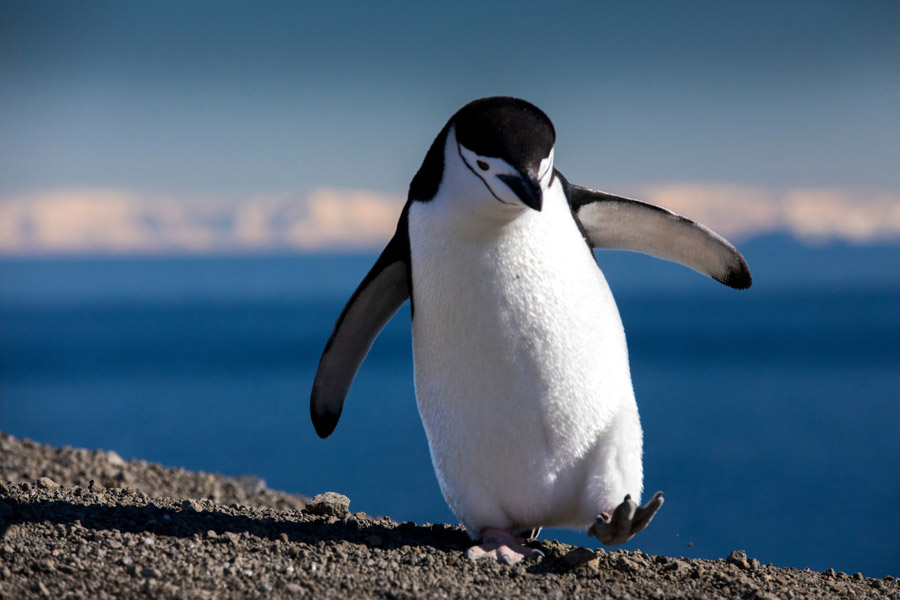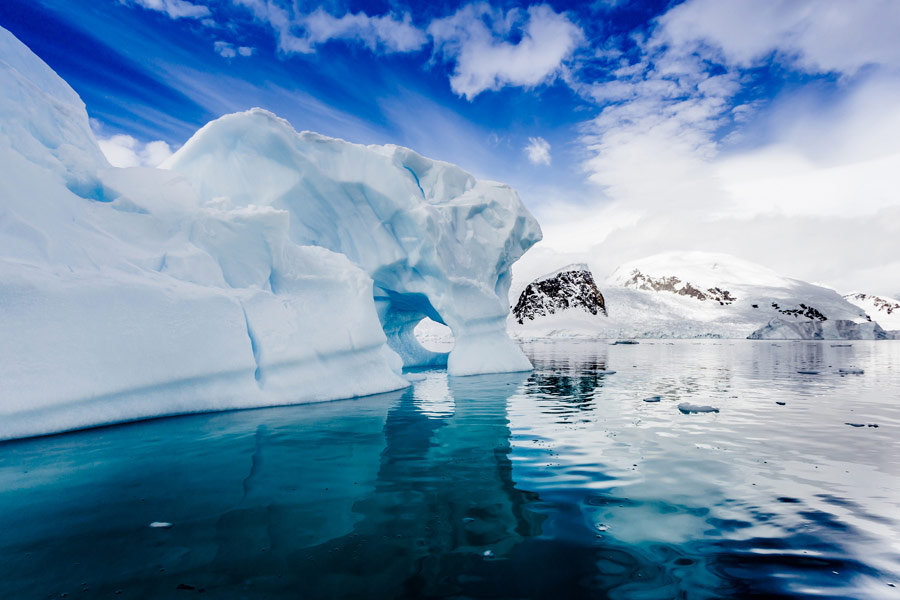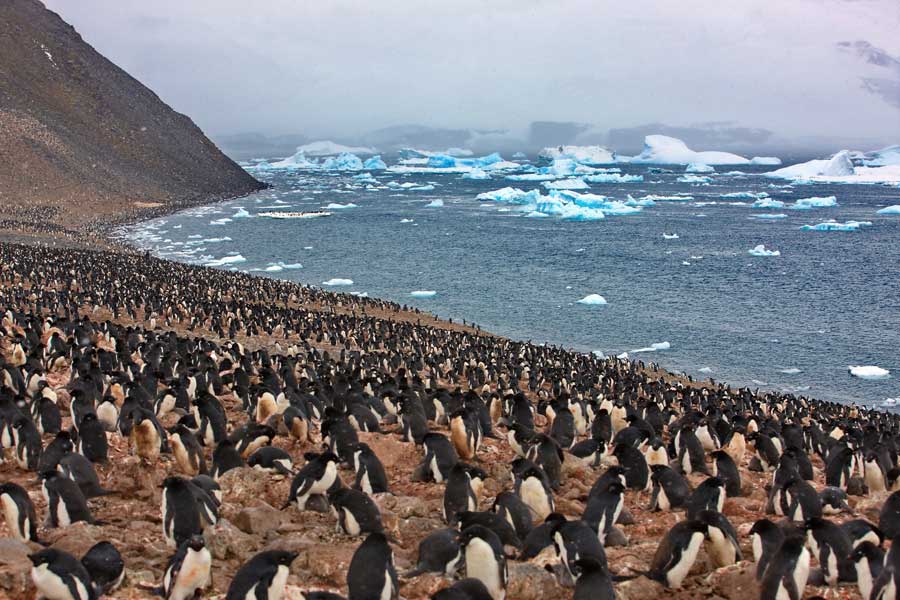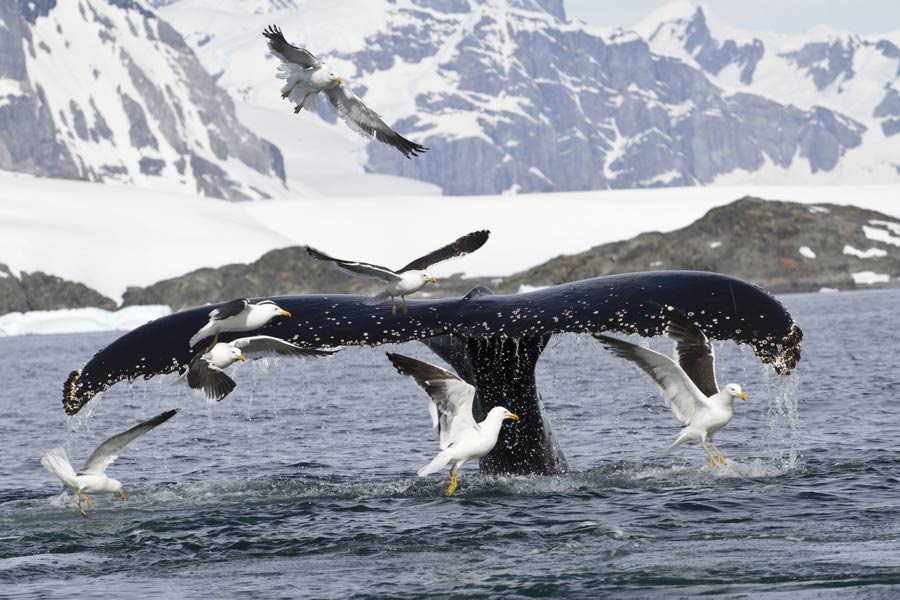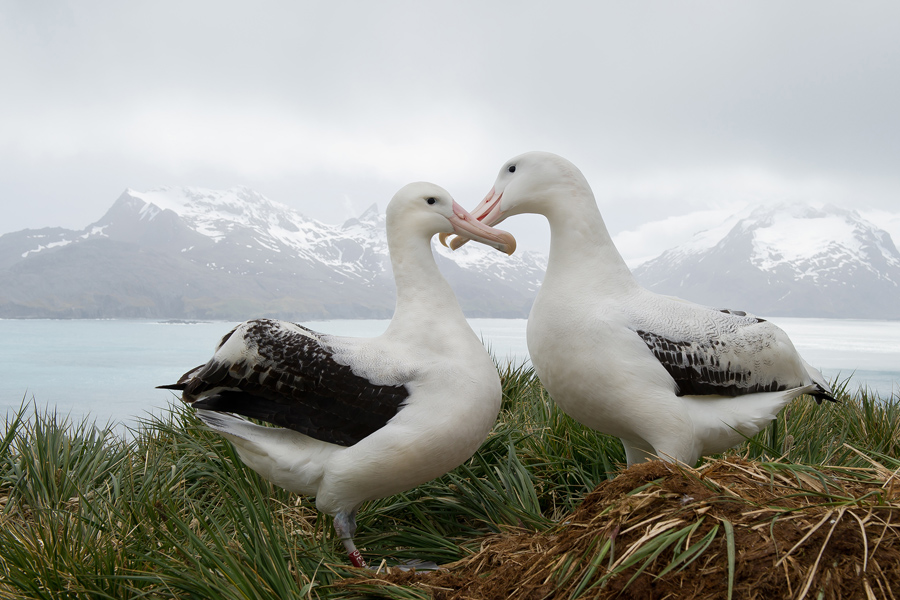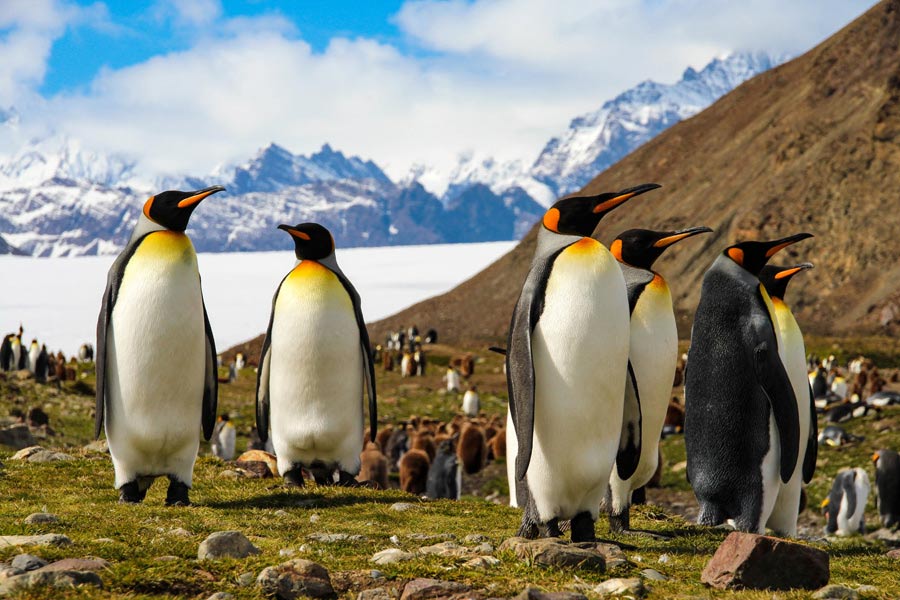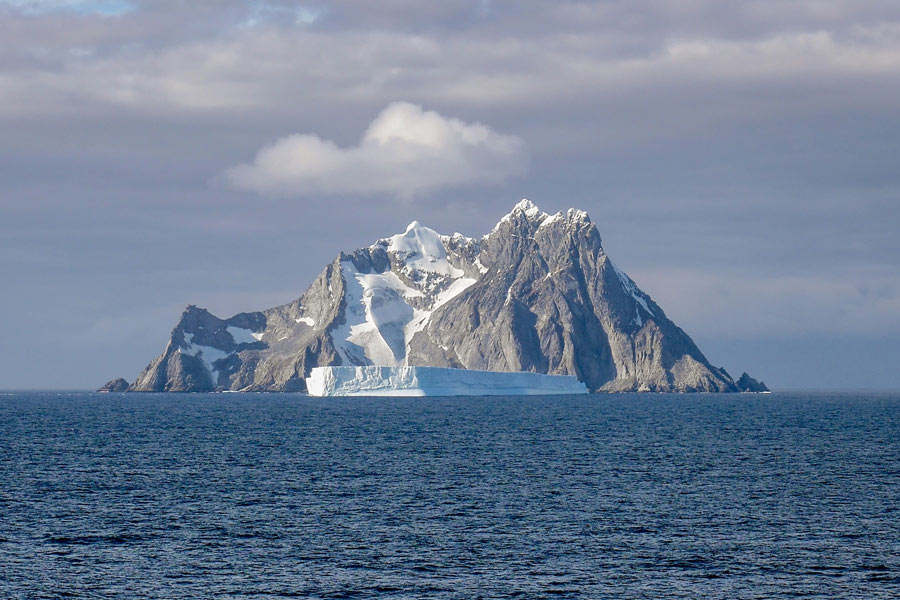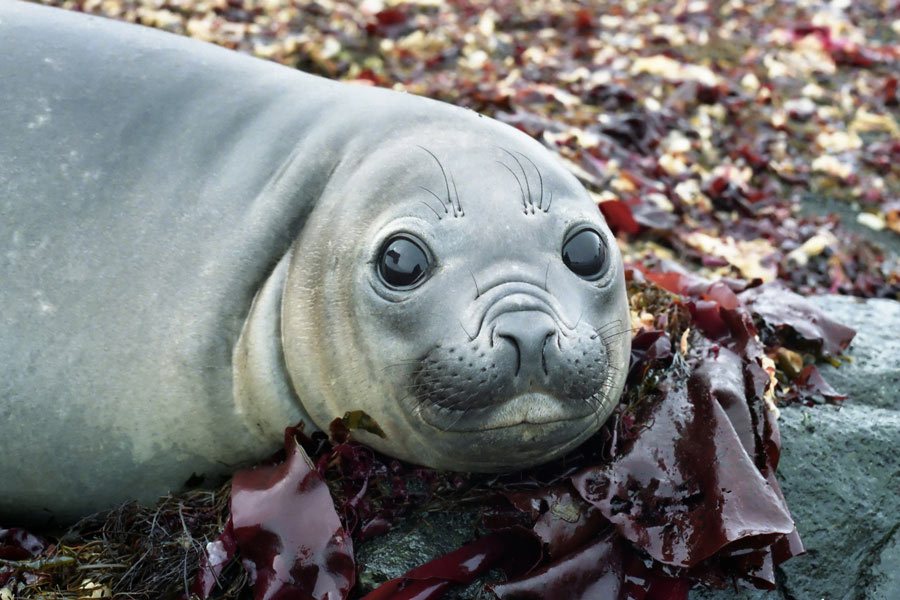Remote Weddell Sea Explorer | Ortelius
28 Days
From NZD 48,180
STYLE: Small Ship Expedition Cruise
Trip Code: ACOWRWSE
DIFFICULTY RATING: 2 (light adventure)
Start: Ushuaia, Argentina
Finish: Ushuaia, Argentina
SHIP: Ortelius
 Destination
Destination
Antarctica, South Georgia and Weddell Sea
 Departure Date
Departure Date
22/01/2026, 18/02/2026
 Meals
Meals
All Meals On board The Ship
 Transport
Transport
Group Transfers On Disembarkation To The Airport
 Accommodation
Accommodation
Cabin on board a ship
Enquire Now
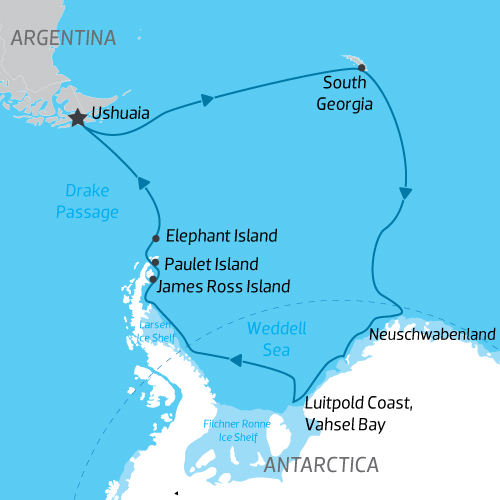

 Included Sightseeing
Included Sightseeing
Daily Antarctica Excursions in location, Zodiac Cruising, On board Expert Lectures & Briefings by the Experienced Expedition Team. Helicopter Transfers (Subject to T&C's - see notes)
NOTE: Itinerary is subject to change depending on weather & ice conditions

Visit South Georgia

Whale watching

Weddell Sea

See King Penguins in South Georgia

Zodiac Cruising
Cruise by Zodiacs amongst the beautifully sculpted icebergs and take excursions from the ship to explore local bays, channels and landing sites
OVERVIEW
This adventurous expedition explores one of the least-visited areas on Earth, Antarctica’s amazing Weddell Sea. After visiting some of the same sites legendary explorer Ernest Shackleton’s charted in South Georgia, we’ll enjoy the Weddell’s exotic wildlife and colossal tabular icebergs.
Your Weddell Sea expedition starts in South Georgia after leaving Ushuaia, where we'll be on the trail of famed polar explorer Ernest Shackleton and his ship Endurance, experiencing the Weddell Sea’s amazing wildlife and tabular icebergs before returning via Elephant Island.
The continental borders of the Weddell Sea are formed by huge floating sheets of ice. These ice shelves produce the massive tabular icebergs that are so abundant in the Weddell Sea. Incredibly, scientists have declared the waters of the Weddell Sea to be the clearest water of any sea on Earth, creating unbelievable photography opportunities.
The east side of the Weddell, with its epic tabular icebergs, is particularly great for photos, especially since the chance of landings can be limited due to these ice formations. Zodiac cruises and possible ice landings are wonderful alternatives, if conditions allow.
The Weddell Sea is home to a large number of orcas, humpbacks, and minke whales as well as leopard, Weddell, and crabeater seals. Several penguin species can be seen there too.
On the ship, our structured educational program will complement other activities. You will have the chance to learn all about the area’s wildlife, landscape, history, political status, and more. We actively participate in citizen science projects, and you can also participate in such projects.
*Helicopter transfers:
During these voyages, we transfer our passengers to shore using Zodiacs and operate helicopters in areas where Zodiacs cannot be used. If conditions allow for helicopter transfers, we will attempt landings on both land and sea ice.
Our plan is to make helicopter landings when possible, though we cannot guarantee a specific amount of helicopter time in advance. Helicopters provide a great advantage in reaching certain landing sites that are otherwise almost inaccessible, but local conditions (weather, ice, and other forces of nature) determine the final itinerary. These conditions may change rapidly, impacting our ability to use helicopters. Please understand and accept this. Safety is our greatest concern, and no compromises can be made.
The vessel is equipped with three helicopters. One helicopter always needs to be supported by a second functioning helicopter. No guarantees can be given, and in no event will claims be accepted.
*Rates are subject to currency fluctuation and availability at the time of booking. Please contact us for the latest pricing and availability.
ITINERARY

Your voyage begins where the world drops off. Ushuaia, Argentina, reputed to be the southernmost city on the planet, is located on the far southern tip of South America. Starting in the afternoon, you embark from this small resort town on Tierra del Fuego, nicknamed “The End of the World,” and sail the mountain-fringed Beagle Channel for the remainder of the evening.
Enroute to South Georgia, you now cross the Antarctic Convergence. The temperature cools considerably within the space of a few hours, and nutritious water rises to the surface of the sea due to colliding water columns. This phenomenon attracts a multitude of seabirds near the ship, including several species of albatross, shearwaters, petrels, prions, and skuas.

Entering the South Georgia Maritime Zone, one of the largest protected waters in the world, we sail past the Shag Rocks. These impressive rocks lay 240km (150 miles) west of South Georgia and are home to several thousand South Georgia shags. The area around the rocks is known for its abundance of larger marine mammals, which feed on this comparatively shallow area of the South Georgia Ridge.
After reaching South Georgia, you will have the chance to visit some of the following sites:
Prion Island – This location is closed during the early part of the wandering albatross breeding season (November 20 – January 7). From January on, the breeding adults have found their partners and are sitting on eggs or nursing their chicks. Enjoy witnessing the gentle nature of these animals, which possess the largest wingspan of any birds in the world.
Fortuna Bay – A beautiful outwash plain from Fortuna Glacier is home to a large number of king penguins and seals. Here you may also have the chance to follow the final leg of Shackleton’s route to the abandoned whaling village of Stromness. This path cuts across the mountain pass beyond Shackleton’s Waterfall, and as the terrain is partly swampy, be prepared to cross a few small streams.
Salisbury Plain, St. Andrews Bay, Gold Harbour – These sites not only house the three largest king penguin colonies in South Georgia, they’re also three of the world’s largest breeding beaches for Antarctic fur seals. Literarily millions breed on South Georgia during December and January. By February the young fur seals are curious and playful and fill the surf with life and fun and large elephant seals come to the beaches to moult.
Grytviken – In this abandoned whaling station, king penguins walk the streets and elephant seals lie around like they own the place – because they basically do. Here you might be able to see the South Georgia Museum as well as Shackleton’s grave.
In the afternoon of day 6 and depending on the conditions, we will start sailing southwards in the direction of the South Sandwich Islands.

Like Shackleton in December 1914 on the Imperial Trans-Antarctic Expedition, also known as the Endurance Expedition, we leave South Georgia and aim for the South Sandwich Islands and the Weddell Sea.
There may be sea ice on this route, and at the edge of the ice some south polar skuas and snow petrels could join the other seabirds trailing the vessel south.

While we are unable to land here, we may be able to make a Zodiac cruise among the amazing scenery of this active volcanic area. Passing between Thule and Cook Islands will be one of the trip’s many highlights and will make an everlasting impression.
There is a good chance we’ll encounter humpback and minke whales in this area. On and around the islands, we also have the chance to spot brown skuas, chinstrap or Adélie penguins, and several species of albatross: grey-headed, black-browed, and wandering.

We next sail toward the Antarctic continent in the direction of Queen Maud Land and Neuschwabenland (New Swabia) on the northeast side of the Weddell Sea.

Our first destination in Antarctica is New Swabia, between 20°E and 10°W in Queen Maud Land. This area was explored by Germany during the third German Antarctic Expedition of 1938 – 1939, led by Alfred Ritscher. The purpose was to find an area in Antarctica for a German whaling station and scout a possible location for a naval base.
In an attempt to claim the region, Nazi flags were placed on the sea ice along the coast locations. Survey flights also airdropped aluminium arrows with swastikas.

Sailing deep into the Weddell Sea, chances are we can spot crabeater, leopard, or Weddell seals. If we are lucky, we might even see emperor penguins. Humpback, orca, and minke whales are also present in this area, along with various birdlife.
Ice conditions in the Weddell Sea vary seasonally. We will encounter a vast nautical wilderness of sea, and while heading to high latitudes (far south) will enjoy the raw beauty and power that makes Antarctica so special. It will become apparent why it took so long to discover the Great White Continent and how tough it must have been for Shackleton’s expedition.
We’ll make a circular route toward the Brunt Ice Shelf and along the Luitpold Coast, discovered and named during the second German Antarctic expedition (1911 – 1912) of Wilhelm Filchner. If conditions allow, we will have opportunities for a Zodiac cruise and possibly an ice floe landing.
We now head west toward the Filchner–Ronne Ice Shelf before changing course north, following the coast along the eastern side of the Antarctic Peninsula and Larsen Ice Shelf. This brings us close to the spot where Shackleton’s vessel Endurance was trapped in pack ice during his Imperial Trans-Antarctic Expedition (1914-17), drifting toward the Antarctic Peninsula before ultimately sinking. In an exciting conclusion to this story, the wreck was discovered on March 5, 2022, the 100th anniversary of Shackleton’s burial, after 107 years below the Weddell Sea waves. While we can’t get close to the discovery site due to pack ice, we will be in the area where the ship was trapped and abandoned. There are colonies of 6,500 emperor penguins nearby, so we hope to see one or more in this area.
As we reach the northern section of the Antarctic Peninsula, we enter the area of Erebus and Terror Gulf. Far-wandering emperor penguins often perch on Snow Hill Island’s numerous ice floes, possibly offering you another opportunity to spot these emblematic creatures. If conditions allow, we may attempt a landing on James Ross Island.

This morning we hope to land at one of the most scenic locations in the northern Antarctic Continent, with a large Adélie penguin rookery, gentoo penguins, and nesting snow petrels also to be found. Sheer canyon walls, fallen boulders, and beautiful volcanic creations capped with ice make Brown Bluff a truly unforgettable location.
Across the Antarctic Sound is Kinnes Cove, where you can see the nearby Madder Cliffs with their subtle red coloration as well as possible gentoo penguins.

This is the starting point from which Shackleton left to find help for his stranded crew. Using only a small lifeboat, the James Caird, he and five of his men sailed to South Georgia, then walked 36 hours to Stromness. It’s hard not to marvel at how they accomplished that herculean feat.
Twenty-two members of his Imperial Trans-Antarctic Expedition, also known as the Endurance Expedition, were stranded on Elephant Island after their vessel Endurance sank in the Weddell Sea. It took four and a half months to complete the legendary rescue.
Conditions on Elephant Island are severe. The coastline is mostly made up of vertical rock and ice cliffs highly exposed to the elements. If possible, you will take the Zodiacs to Point Wild, where the marooned members of Shackleton’s expedition miraculously managed to survive.

Your return voyage is far from lonely. While crossing the Drake, you might see some of the same wildlife encountered at the start of your voyage: albatrosses, petrels, maybe even a minke whale spouting up sea spray.

Every adventure, no matter how grand, must eventually come to an end. It’s now time to disembark in Ushuaia, but with memories that will accompany you wherever your next adventure lies.
WHY CHOOSE THIS CRUISE?
-
Visit a seldom seen part of Antarctica, the remote Weddell Sea, as far as the historic Newschwabenland, and close to the point where Shackleton's Endurance was shipwrecked.
-
You may even be lucky enough to spot the magnificent Emperor Penguin, along with Adelie and Gentoo Penguins.
-
Weather permitting, explore the shores of Elephant Island where Shackleton's shipwrecked crew waited for 4.5 months to be rescued.
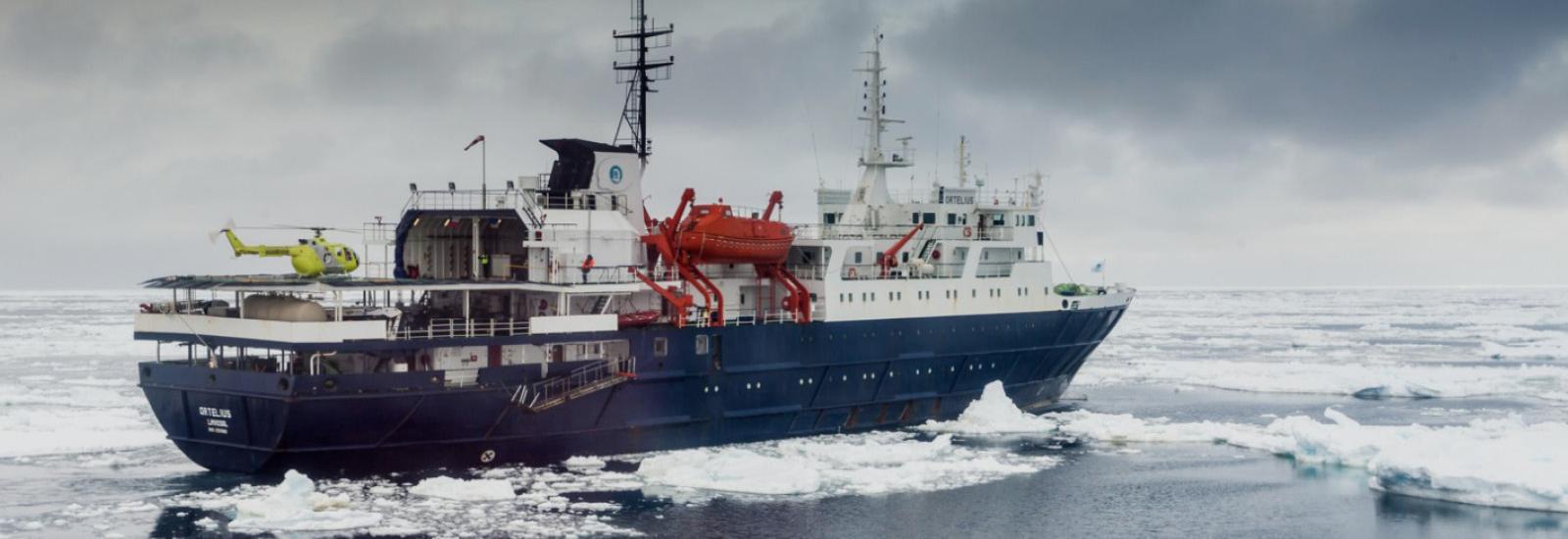
Ortelius
With its origins in Poland, the M/V Ortelius now plies the waters of the Antarctic and Arctic as an ice-strengthened Polar expedition vessel. It is named after the Flemish cartographer and geographer, Abraham Ortelius, who also created the first modern atlas. Adept at navigating through solid one year sea-ice and loose multi-pack ice, this ship is ideally suited to reaching more remote locations such as the Ross Sea. The comfortable M/V Ortelius accommodates up to 108 passengers in 50 cabins. Staterooms range from quadruple and triple cabins with portholes and both upper and lower berths, to twin porthole, window and deluxe cabins with lower berths only up to superior cabins which feature a double bed. The ship has plenty of open-deck spaces as well as a large bridge accessible to passengers. Alongside the expedition team that is made up of an expedition leader plus 5 guides/lecturers, the ship is manned by 34 extremely experienced nautical crew, an international catering staff and you can find a doctor onboard for any required medical attention. On board there are also two restaurants, a bar/lecture room and a sauna. There are 11 Zodiacs on board, maximising time spent on shore and wildlife opportunities.
Ice Class:
Length: 90.95m / 299.4ft
Breadth: 17.20m / 57.8ftMax
Draft: Cruising
Speed: 14.5 knots
Electricity: 240 volts Passenger
Capacity:116 passengers & 52 Crew & Staff
View Ship Details
Accommodation
We believe that appropriate accommodation should add to the authentic travel experience, as well as providing utmost enjoyment. For that reason our accommodation is scrutinised by our staff on the ground frequently, ensuring the properties adhere to our high standards. This key will help you understand the levels of accommodation available on this tour.

Standard
Comfortable properties with dependable facilities and service.

Superior
Comfortable properties with dependable facilities and service.

Deluxe
Luxurious properties with impeccable facilities and service.
Included ACTIVITIES
These are included in your cruise fare. Activities vary by itinerary and destination and are subject to regulations, weather conditions and other factors.




OPTIONAL ADVENTURES ADD ONS
These can be booked in advance at an extra cost. Activities vary by itinerary and destination.

Pricing per person & date
Updated 03 Apr 2025
| Remote Weddell Sea Explorer | Ortelius from NZD 48,180 | ||
| Departing | Ending | Duration |
|---|---|---|
| 22 Jan 2026 | 18 Feb 2026 | 28 |
| 18 Feb 2026 | 17 Mar 2026 | 28 |
EXTEND YOUR TRIP
Important Information
Prices are based on per person, and may be based on quad/triple/twin share.
Prices are correct at time of publishing but are subject to change at any time.
Itinerary is subject to change depending on weather and ice conditions.
Helicopter transfers:
During these voyages, we transfer our passengers to shore using Zodiacs and operate helicopters in areas where Zodiacs cannot be used. If conditions allow for helicopter transfers, we will attempt landings on both land and sea ice.Our plan is to make helicopter landings when possible, though we cannot guarantee a specific amount of helicopter time in advance. Helicopters provide a great advantage in reaching certain landing sites that are otherwise almost inaccessible, but local conditions (weather, ice, and other forces of nature) determine the final itinerary. These conditions may change rapidly, impacting our ability to use helicopters. Please understand and accept this. Safety is our greatest concern, and no compromises can be made.
The vessel is equipped with three helicopters. One helicopter always needs to be supported by a second functioning helicopter. No guarantees can be given, and in no event will claims be accepted.
All itineraries are for guidance only. Programs may vary depending on ice, weather, and wildlife conditions. Landings are subject to site availabilities, permissions, and environmental concerns per IAATO regulations. Official sailing plans and landing slots are scheduled with IAATO prior to the start of the season, but the expedition leader determines the final plan. Flexibility is paramount for expedition cruises. The average cruising speed for our vessel is 10.5 knots.
INCLUSIONS
Cabin Accommodation on board MV Ortelius
All meals throughout the voyage aboard the ship including snacks, coffee and tea
All shore excursions and activities throughout the voyage by Zodiac
Program of lectures by noted naturalists and leadership by experienced expedition staff
Free use of rubber boots and snowshoes
Group departure transfers in Ushuaia (directly after disembarkation)
All miscellaneous service taxes and port charges throughout the programme
Comprehensive pre-departure material
Helicopter transfers if weather and conditions permit
Access to 1.5 GB of free internet connectivity per person, which resets every 24 hours. Supplementary vouchers available to purchase on onboard. Subject to satellite coverageEXCLUSIONS
Airfares to/from disembarkation city
Visa & passport fees (if applicable)
Travel insurance
Beverages (other than tea & coffee)
Meals ashore
Personal expenses such as laundry & bar
Gratuities for the crew (guidelines will be provided)
Pre and post land arrangements
Government arrival or departure taxes (if applicable)
Additional optional activities
- 2 (light adventure)
Available upon request. Please contact us for more details. No single supplement will apply if willing to share in selected cabins.
Departure Date, Fuel Surcharges, Cabin Category, Currency Fluctuations, Seasonality & Availability.
